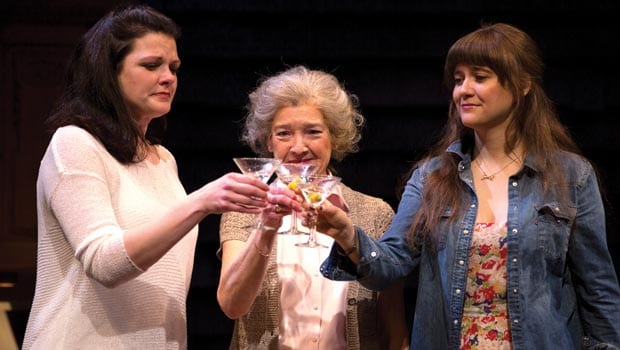Huntington Theatre’s ‘Rapture, Blister, Burn’ presents witty, poignant tale of two women
Comedy is on stage at the Boston Center for the Arts through June 30


Author: T. Charles EricksonTimothy John Smith and Kate Shindle in the Huntington Theatre Company’s production of “Rapture, Blister, Burn,” which runs through June 30 at the Boston Center for the Arts.
Boston The Huntington Theatre Company production of Gina Gionfriddo’s smart and poignant comedy, “Rapture, Blister, Burn,” on stage at the Boston Center for the Arts through June 30, brings out the play’s fast-paced wit and, along with the humor, its touch of doubt and heartache.
Directed by Huntington Artistic Director Peter DuBois, the winning production examines the tradeoffs faced by two women, both 42, who find that each wants what the other has in life.
Hotshot academic and world-traveling pundit Catherine Croll returns home to care for her mother, who is recovering from a heart attack. Fearing that her mother will soon die, leaving her to face life alone, Catherine rues what she has passed up — marriage and children.
She visits her friends Gwen and Don Harper, formerly fellow graduate students. Gwen yearns to complete her studies, which she interrupted to marry Don and stay at home to raise their young children. Once as ambitious and talented as Catherine, Don is now a pot-smoking, porn-watching dean of a school he describes as “a fourth-rate liberal arts college.”
He is also Catherine’s old flame, nabbed by Gwen when Catherine took a prestigious job in London. Catherine’s mother, Alice, is nudging her daughter to steal him back. Rounding out this three-generation quintet is Avery, a student who at age 21 finds Catherine’s life far more desirable than Gwen’s.
As the characters interact and expose their outer and inner lives, the clever sets by Alexander Dodge interlock and unfold, shifting from the Harpers’ urban patio to Alice’s gracious living room, where Alice cheerfully dispenses martinis while her daughter conducts a summer school course, “The Fall of American Civilization.” Her sole students are Gwen and Avery.
As Alice, a mischievous WASP matron, Nancy E. Carroll lights up the stage with her droll comic timing and glee.
Over the play’s two acts, Kate Shindle’s Catherine evolves from a gleaming totem into a more human figure. In the difficult role of Gwen, who never stops trying too hard, Annie McNamara conveys her character’s over-the-top anxiety and anger with a touch of wit. As Don, a hapless male with his own unfulfilled longings, Timothy John Smith injects enough warmth and charm to keep this slacker from being a total loser.
Mimi O’Donnell’s costumes accent the lifestyles of the characters, from Alice’s tailored blouses and pleated skirts to Catherine’s sleek black sheath and Avery’s rag-doll chic. Also key to the staging are deft lighting by Jeff Croiter and M.L. Dogg’s crisp sound design.
In the first act, Don, Gwen and Catherine often face the audience while talking to each other, as if what they say is more important than who they are. They are distant from one another. In the second act, the characters let down their defenses and the actors get to play real people. The comic verve of an ensemble takes over. And the dilemmas they explore expand beyond feminism and its discontents to larger themes such as the capacity of an individual or a couple to grow and change — all without skipping a comic beat.
In her first class, Catherine steers Avery and Gwen into a survey of feminist history, a discussion that becomes a tripwire for personal revelations. Catherine and Gwen portray what appear to be two mutually exclusive ways of life. Catherine is the sexy scholar who is alone in the world. Gwen is the dedicated homemaker who makes lists to keep her husband on track but yearns for her own agenda.
Both touching and funny, Shannon Esper excels as Avery, the character through whom the playwright seems to voice her own questions.
Gionfriddo gives Avery many of the play’s best lines. After Gwen and Catherine lament what is missing in their lives, Avery asks them, “You either have a career and wind up lonely and sad, or you have a family and wind up lonely and sad?”
In a sweet final scene, as Alice, Avery and Catherine share a toast to freedom, they let a bit of uncertainty show in their eyes.






